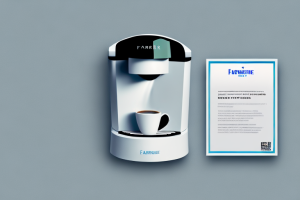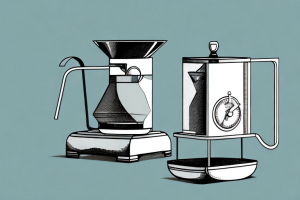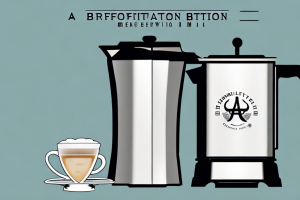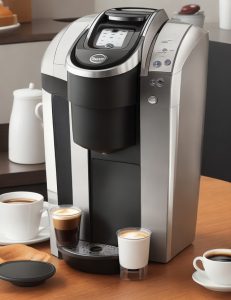Clean A Bunn Coffee Maker

A bunn coffee maker
Coffee lovers know that a Bunn coffee maker is a great investment for a perfect brew. But, like any other appliance, it needs to be cleaned and maintained regularly. The good news is that cleaning a Bunn coffee maker is easy and straightforward. In this article, we discuss why it’s essential to clean your Bunn coffee maker, how to do it step-by-step, the materials you will need for the process, how often you should clean it, and how to troubleshoot some common problems. Let’s get started!
Why It’s Important to Clean Your Bunn Coffee Maker Regularly
Cleaning your Bunn coffee maker regularly ensures a great-tasting coffee and also prolongs the life of your appliance. Over time, minerals, oils, and coffee residues accumulate inside the coffee maker. These deposits impede the flow of water and make your coffee taste bad, acidic, and bitter. Besides, these deposits can cause the machine to malfunction, reducing its longevity. Therefore, a periodic cleaning prevents blockages, maintains the quality of your brewed coffee, and makes your coffee maker last longer.
Additionally, cleaning your Bunn coffee maker regularly can also prevent the growth of harmful bacteria and mold. The warm and moist environment inside the coffee maker can be a breeding ground for these microorganisms, which can cause health problems if ingested. By cleaning your coffee maker, you can eliminate any potential health risks and ensure that your coffee is safe to drink. So, not only does cleaning your Bunn coffee maker improve the taste and lifespan of your appliance, but it also promotes a healthier coffee-drinking experience.
Step-by-Step Guide to Cleaning a Bunn Coffee Maker
Cleaning your Bunn coffee maker is a simple process. Follow these steps to keep it in top shape:
- Turn off and unplug your coffee maker from the outlet.
- Remove the spray head and the brew funnel.
- Wash them gently with warm, soapy water. Rinse them thoroughly and let them dry.
- Fill the decanter with 50% white vinegar and 50% water.
- Pour the solution into the coffee maker’s water reservoir.
- Put the spray head and brew funnel back in their respective places.
- Turn on the brewer and let it brew for at least 15 minutes.
- Discard the vinegar solution and run two cycles of water through the coffee maker to remove any remaining deposits and vinegar residue.
- Reassemble and rinse the spray head and brew funnel before attaching them to the coffee maker.
- Fill the water reservoir with fresh water and brew a test batch to ensure there’s no vinegar aftertaste in your coffee.
It’s important to note that you should clean your Bunn coffee maker at least once a month to prevent mineral buildup and ensure the longevity of your machine. If you notice that your coffee maker is taking longer to brew or the coffee tastes off, it may be time for a deep clean.
Additionally, if you have hard water, you may need to clean your coffee maker more frequently. Hard water can cause mineral buildup, which can affect the taste of your coffee and even clog your machine. Consider using a water filter or descaling solution to prevent this issue.
Materials Needed to Clean a Bunn Coffee Maker
To clean your Bunn coffee maker, you need the following materials:
- White Vinegar
- Warm, soapy water
- A Decanter
- Spray head
- Brew funnel
Before you begin cleaning your Bunn coffee maker, it is important to unplug the machine and let it cool down completely. This will prevent any accidents or injuries from occurring during the cleaning process.
Additionally, it is recommended to clean your Bunn coffee maker at least once a month to ensure that it continues to function properly and produce high-quality coffee. Neglecting to clean your coffee maker can result in a buildup of mineral deposits and other impurities that can affect the taste and quality of your coffee.
How Often Should You Clean Your Bunn Coffee Maker?
Bunn recommends cleaning your coffee maker after every 100 brew cycles or at least every three months. However, if you live in an area with hard or mineral-rich water, you may need to clean it more frequently. Hard water contains minerals such as calcium and magnesium, which deposit in the coffee maker’s heating element and piping system, leading to blockages. So, if your coffee maker is brewing less coffee than usual, producing a bad taste or showing signs of mineral deposits, then it’s time to clean it.
Additionally, it’s important to note that the type of coffee you use can also affect how often you need to clean your Bunn coffee maker. Oily or flavored coffee can leave residue in the machine, which can build up over time and affect the taste of your coffee. If you frequently use these types of coffee, it’s recommended to clean your coffee maker more often than the recommended three months or 100 brew cycles.
Tips for Maintaining Your Bunn Coffee Maker
Besides cleaning, there are a few maintenance tips that will keep your Bunn coffee maker in excellent condition:
- Always use clean water instead of tap water or softened water.
- Replace the water filter every three months if you have hard water.
- Remove coffee residues from the spray head and brew funnel after each use.
- Descale your coffee maker annually using citric acid or a descaling solution.
- Store your coffee maker in a dry and cool place to prevent mold growth.
Additionally, it is important to regularly check the power cord and plug of your Bunn coffee maker for any signs of damage or wear. If you notice any issues, it is best to replace the cord or plug immediately to avoid any potential safety hazards. It is also recommended to periodically check the water tank for any cracks or leaks, and to replace it if necessary to ensure the proper functioning of your coffee maker.
How to Deep Clean a Bunn Coffee Maker
Deep cleaning your Bunn coffee maker helps remove even the toughest mineral deposits and coffee residues. Follow these steps:
- Turn off and unplug your coffee maker.
- Remove the spray head and brew funnel, and wash them with warm, soapy water.
- Plug the coffee maker and fill the water reservoir with a 50/50 mixture of vinegar and water.
- Place the decanter on the warming plate, and run a brewing cycle.
- Once the brewing cycle is complete, unplug the coffee maker and let it cool for at least 30 minutes.
- Take out the water reservoir and pour out any remaining vinegar solution.
- Fill the reservoir with water and attach it back to the coffee maker.
- Repeat step four with the fresh water to rinse out the vinegar deposits thoroughly.
- Turn on the coffee maker and run two brewing cycles with fresh water to remove any remaining vinegar residue.
- Reassemble the spray head and brew funnel.
- Run a brewing cycle with fresh water, and your coffee maker is ready to use.
It is recommended to deep clean your Bunn coffee maker every three months to ensure optimal performance and longevity. Neglecting to clean your coffee maker can lead to clogs, slow brewing times, and even damage to the machine.
If you notice any unusual smells or tastes in your coffee, it may be a sign that your coffee maker needs a deep clean. Additionally, if you have hard water, you may need to deep clean your coffee maker more frequently to prevent mineral buildup.
Common Problems and Solutions for a Dirty Bunn Coffee Maker
A dirty Bunn coffee maker can cause several problems such as slow water flow, a weak or bitter taste or a machine that does not turn on. Here are some solutions to these problems:
- Slow water flow: a slow water flow is a sign of clogged tubes. Clean the spray head and the brewing funnel, and use a needle to remove any deposits from the spray head holes to restore water flow.
- Bitter taste: bitter coffee results from mineral buildup in the coffee maker. Clean the coffee maker as recommended to dissolve the minerals and improve the taste.
- Machine won’t turn on: Check if the coffee maker is properly plugged in and the switch is on. If the switch is on, the machine may have an electrical defect, and you may need to contact a professional.
How to Remove Hard Water Deposits from Your Bunn Coffee Maker
Hard water deposits in your Bunn coffee maker can block water flow and cause bad taste. Here’s how to remove them:
- Fill the decanter with a solution of half water and half vinegar.
- Pour the solution into the water reservoir and turn on the coffee maker.
- Once the brewing cycle is complete, discard the vinegar solution and run two cycles of water through the coffee maker to rinse it thoroughly.
- If the deposits persist, use a commercial descaling solution, which dissolves minerals and scales in the coffee maker.
- Once you have completed a descaling cycle, rinse your coffee maker thoroughly with fresh water.
Natural Cleaning Solutions for Your Bunn Coffee Maker
You can use natural cleaning solutions to clean your Bunn coffee maker without harming the environment. Here are some natural cleaning solutions:
- Baking Soda and Vinegar: Mix equal parts of baking soda and water to form a paste. Apply the paste to the coffee maker’s internal components, including the carafe, spray head, and reservoir, and rinse thoroughly with a vinegar solution.
- Citric Acid: Citric acid is a powerful natural cleaner that dissolves mineral deposits and descales the coffee maker. Fill the water tank with a citric acid solution and run a brewing cycle. Rinse thoroughly with water.
Troubleshooting Tips for a Malfunctioning Bunn Coffee Maker
Here are some tips to troubleshoot your Bunn coffee maker if it’s not functioning correctly:
- Check if the machine is properly plugged in and the switch is on.
- Check if the water reservoir is empty, and if it needs to be refilled.
- Make sure the spray head and brew funnel are correctly attached.
- Check if the warming plate is clean and functioning.
- If the machine is still not working, contact a professional for repair.
How Cleanliness Affects the Taste of Your Brewed Coffee
The taste of your brewed coffee depends on how clean your Bunn coffee maker is. Coffee oils, mineral deposits, and other residues form a coat inside the coffee maker that affects coffee flow and brew quality. Regular cleaning ensures a pure, unadulterated coffee taste with a perfect balance of flavor. So, keep your coffee maker clean to enjoy your favorite cup of coffee every time!
Finally, cleanliness is critical in every kitchen appliance, and a coffee maker is not an exception. Regular cleaning and maintenance of your Bunn coffee maker are essential to ensure a long-lasting and great-tasting brew. Follow the steps and tips mentioned above to keep your coffee maker in top shape. Happy brewing!



